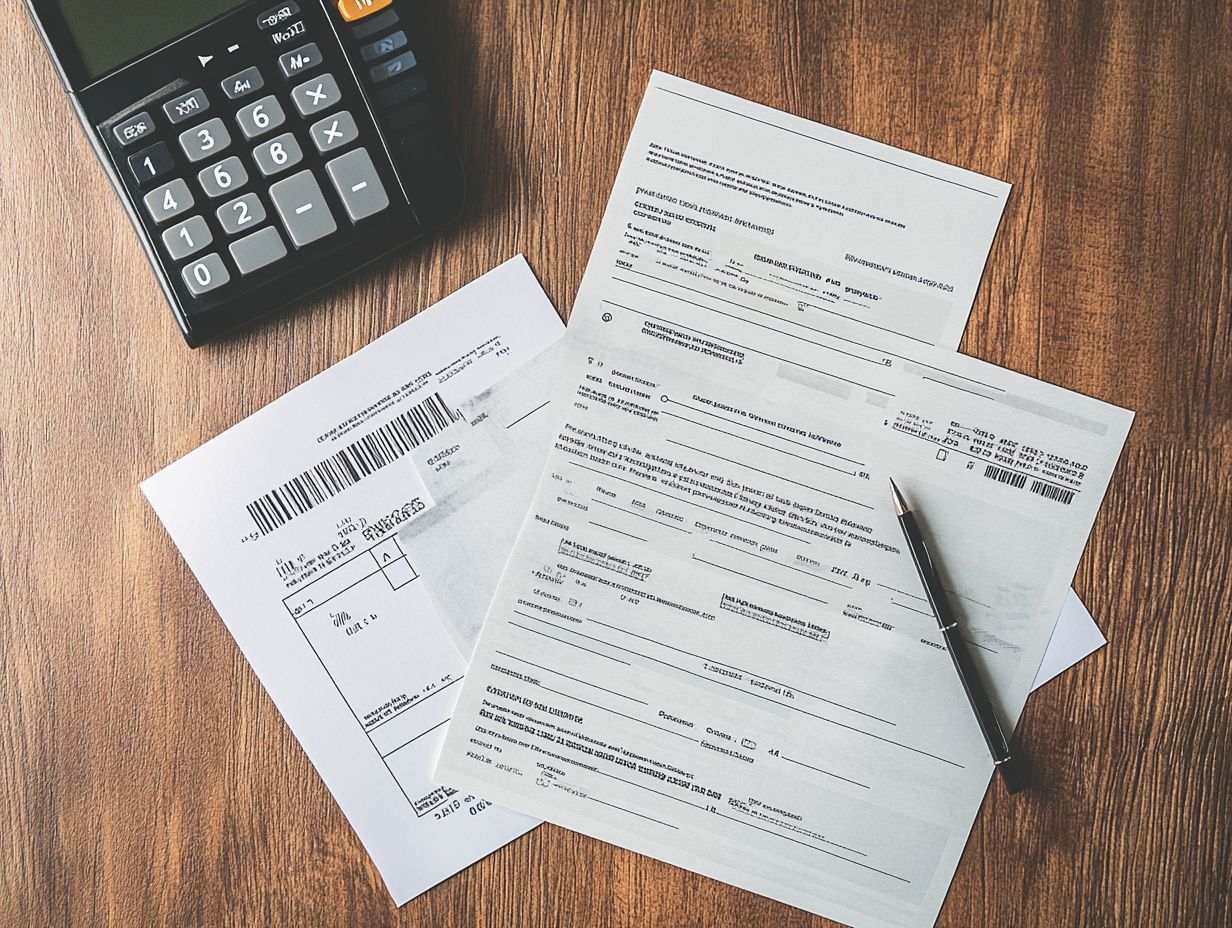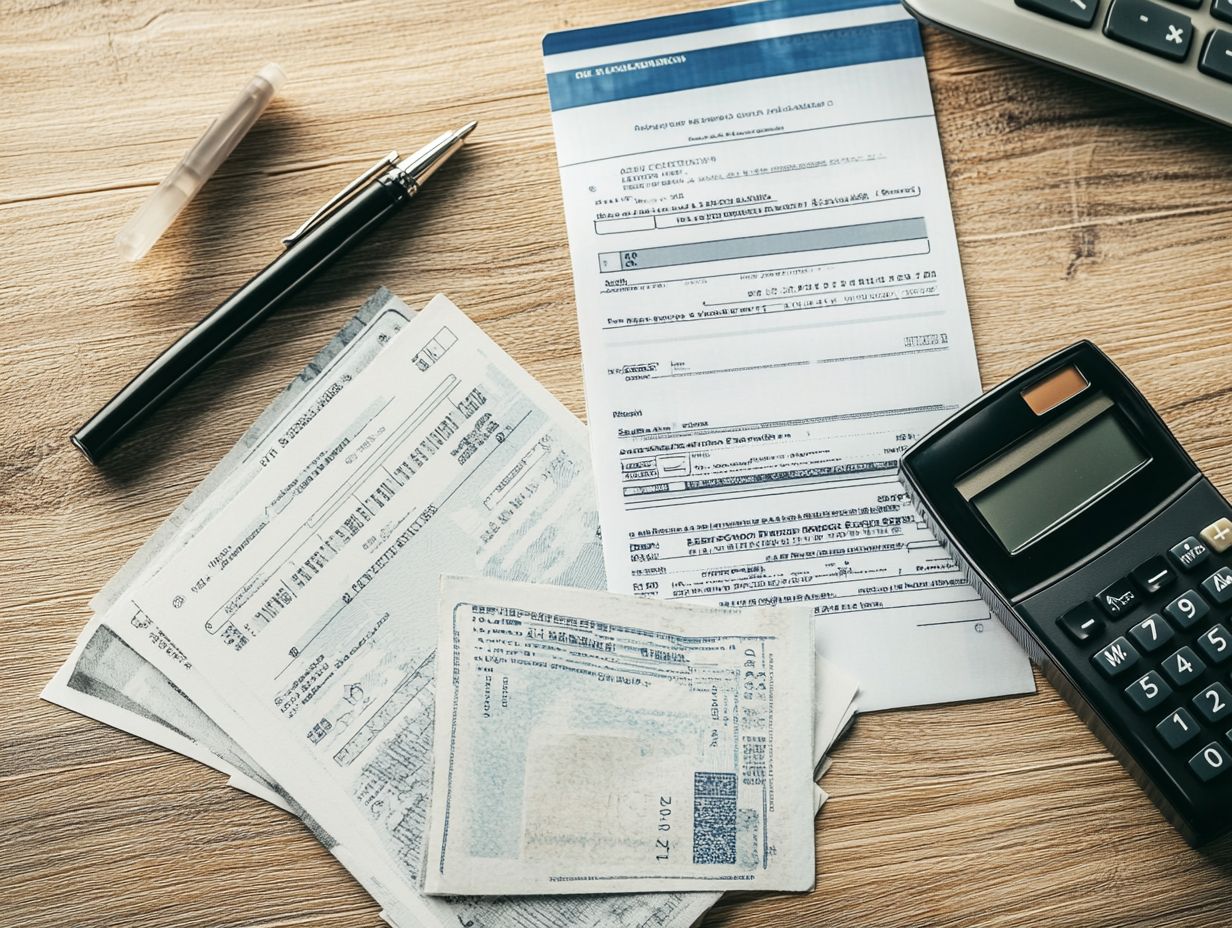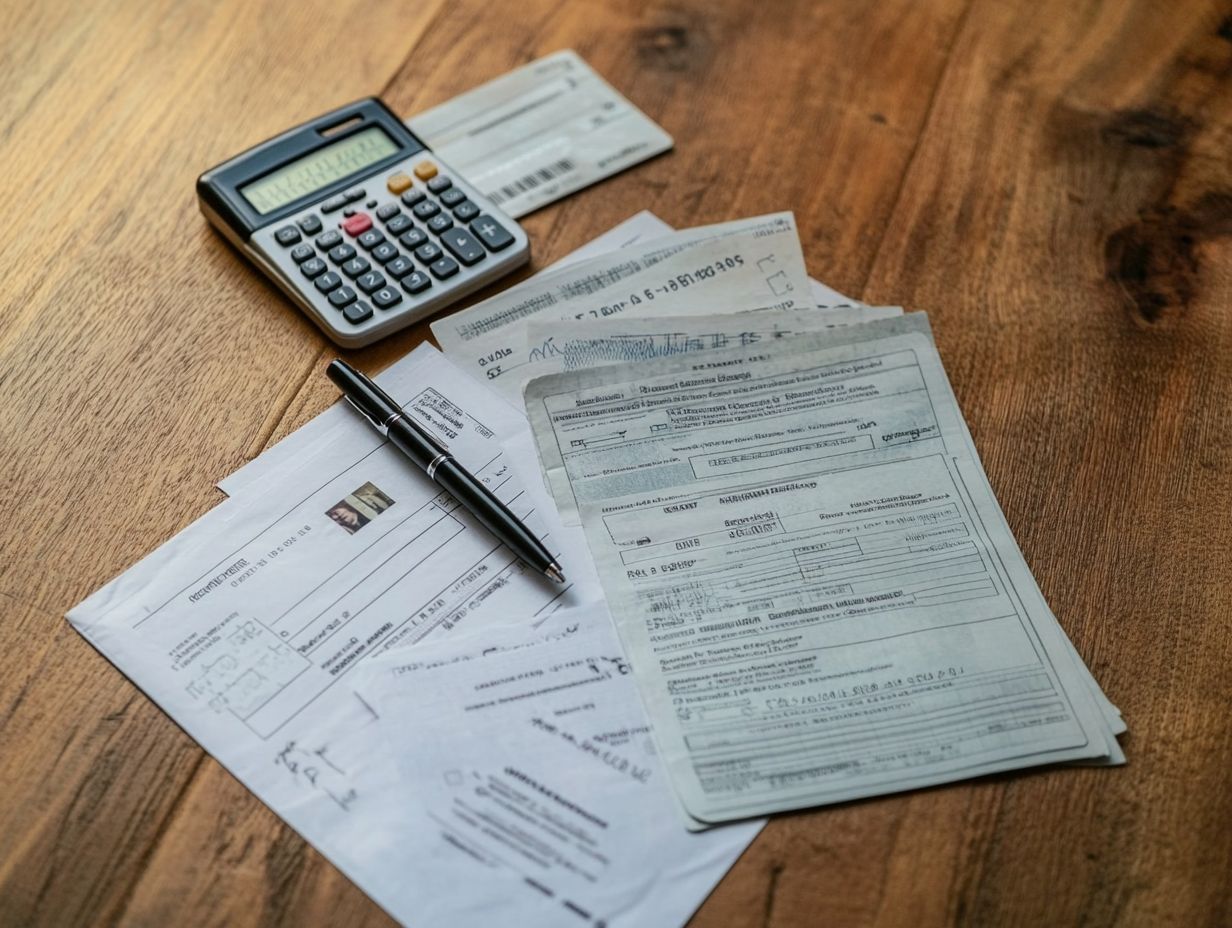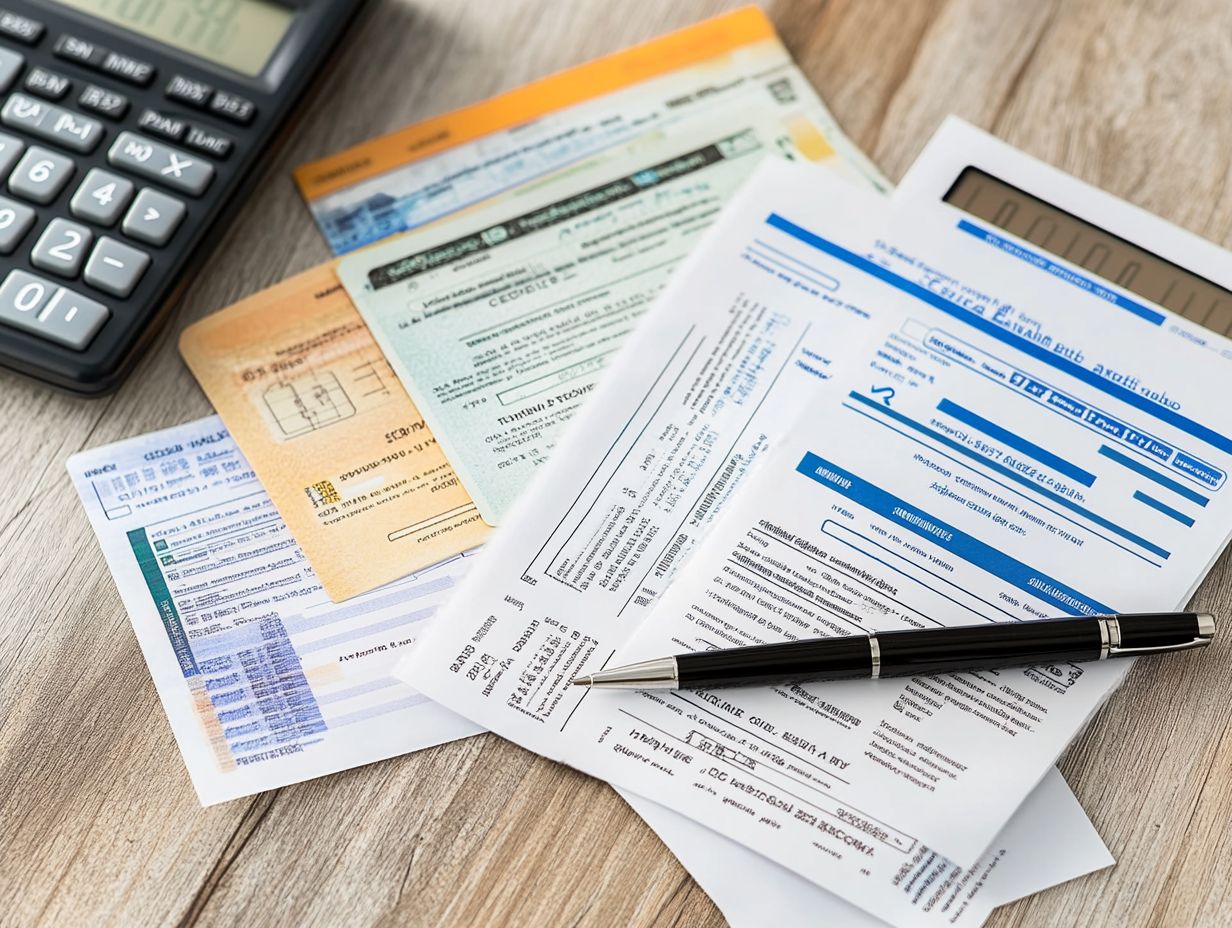5 Key Documents Needed for Your Credit Card Application
When you apply for a credit card, understanding the required documents can greatly improve your chances of approval.
This article lists five key documents you need: proof of identification, proof of income, your credit score and report, employment information, and a detailed list of your debts and expenses.
Each document is essential. We ll also share tips to boost your approval odds and highlight common mistakes to avoid.
Whether you’re applying for the first time or looking to improve your chances, this guide is for you!
Contents
- Key Takeaways:
- 1. Proof of Identification
- 2. Proof of Income
- 3. Credit Score and Report
- 4. Employment Information
- 5. List of Existing Debts and Expenses
- Why Are These Documents Required for a Credit Card Application?
- What Are the Minimum Requirements for Each Document?
- What Are the Possible Consequences of Not Providing These Documents?
- How Can One Improve Their Chances of Approval with These Documents?
- What Are the Common Mistakes People Make When Submitting These Documents?
- Are These Documents Required for All Types of Credit Cards?
- Frequently Asked Questions
- What are the 5 key documents needed for my credit card application?
- Can I use my driver’s license as proof of identity for my credit card application?
- Why do I need to provide proof of address for my credit card application?
- What is considered proof of income for a credit card application?
- Do I need to have a good credit score to apply for a credit card?
- What are reference documents and why are they needed for a credit card application?
Key Takeaways:

- Provide proof of identity, income, credit score/report, employment info, and debts/expenses for a successful application.
- Requirements vary, but typically include a government-issued ID and recent income statements.
- Missing these documents might lead to rejection or higher interest rates don t let that happen!
1. Proof of Identification
One key requirement is proof of identification. This verifies your identity and protects against fraud.
Usually, you ll need a government-issued ID like a driver s license or passport. These serve as formal proof of who you are, making the application process smoother.
Providing this identification helps build your credit history, which is crucial for your credit score.
These documents also comply with consumer protection laws, helping safeguard against identity theft.
2. Proof of Income
Proof of income is vital to the credit card application process. It allows banks to check if you qualify for the credit limit you might receive.
Documents like pay stubs, tax returns, and bank statements show your income level and spending habits.
Credit card providers look closely at your debt-to-income ratio. A better ratio enhances your chances of approval.
3. Credit Score and Report
Your credit score and report reflect your credit history, payment habits, and overall creditworthiness.
Credit bureaus use scoring models to determine your financial standing. A higher score often leads to better terms, including lower interest rates.
Regularly check your credit reports for errors and keep track of your debts. Responsible credit use is essential make payments on time and keep your balances low.
4. Employment Information

Employment information is crucial in your credit card application. It offers credit card issuers valuable insights into your job stability and income consistency. These are key factors in assessing your creditworthiness and your ability to achieve your financial goals.
When filling out the application, include specific details such as your employer’s name and contact information, your job title, and how long you ve been in your position. This data helps issuers evaluate not only your current financial situation but also your work history. Your work history reflects your reliability as a borrower.
A steady employment record can significantly enhance your chances of approval and may even lead to higher credit limits. It sends a clear message to lenders that you have a dependable income source capable of meeting your financial obligations.
5. List of Existing Debts and Expenses
Providing a clear list of your existing debts and expenses is crucial during the credit card application process. This information enables lenders to evaluate your credit utilization and overall financial health, helping them determine if they can extend additional credit without jeopardizing your financial stability.
Consider including various obligations such as student loans, mortgages, and your monthly bills, like utilities and insurance. Presenting a comprehensive view of your financial landscape allows lenders to assess the associated risks effectively.
Keeping your credit utilization rate low is essential; it shows responsible debt management. A lower utilization rate often leads to more favorable outcomes for your application and can secure you lower interest rates an advantage for anyone aiming to make savvy financial moves.
Understanding these elements can boost your chances of impressing lenders!
Why Are These Documents Required for a Credit Card Application?
The requirement for various documents in your credit card application serves multiple crucial purposes. It helps establish your creditworthiness, ensures you have consumer protections, and aids financial institutions in making informed decisions. To streamline this process, consider these 5 tips for a quick credit card application process. This ultimately enhances your chances of approval for those coveted credit card offers.
These documents paint a comprehensive picture of your financial situation, covering everything from income verification to existing debt levels. This information is essential for assessing your overall financial health. Lenders use it to gauge risk and determine appropriate credit limits, fostering responsible credit use.
By adhering to the guidelines outlined in the Credit CARD Act, you are protected from unfair fees and misleading practices, promoting transparency in lending.
This balanced approach not only safeguards your interests but also assists banks in making sound lending decisions, contributing to a healthier financial ecosystem for everyone involved.
What Are the Minimum Requirements for Each Document?
Each document required for your credit card application has specific minimum requirements that you must meet. This is crucial for enhancing your chances of approval, and using the right tools can help. Consider exploring the must-have resources for credit card applicants to ensure you align with the eligibility criteria set by credit card issuers.
To successfully navigate the application process, present proof of identification, such as a government-issued photo ID or a passport. Additionally, include documentation that demonstrates stable income, like recent pay stubs or tax returns. You may also need to provide a credit report reflecting your financial history, as potential issuers often evaluate your creditworthiness. Being aware of 5 reasons your credit card application might fail can further enhance your chances of approval.
Ensure that all acceptable documents are clear and legible. Illegible or outdated information can lead to delays or even denials. To improve your chances of approval, consider following 5 tips for international credit card applications. Failing to fulfill these criteria not only jeopardizes your chances of approval but could also damage your credit score, making future applications more challenging.
What Are the Possible Consequences of Not Providing These Documents?

Failing to provide the necessary documents for your credit card application could seriously impact your financial future. Consequences include denial of your application, a detrimental effect on your credit history, and obstacles in achieving your financial health goals.
An incomplete submission can cause long waits in processing time. This waiting period could stretch even longer if the reviewing institution requests additional documentation, adding to your frustration.
Missing information can diminish your chances of approval. Many institutions see the completeness of applications as a reflection of your responsibility. Therefore, ensuring that all required documents are submitted comprehensively not only speeds up the process but also significantly boosts your likelihood of a favorable outcome.
How Can One Improve Their Chances of Approval with These Documents?
To enhance your chances of securing a credit card approval, ensure that all required documents are accurate, complete, and submitted in a timely manner. Additionally, understanding credit card application requirements while maintaining a healthy credit score and showcasing responsible credit behavior is also essential.
Taking the time to meticulously double-check your documentation can impact the application process significantly. Verify the accuracy of your personal information, including income details and employment status, as any discrepancies can raise concerns.
Including all necessary documentation, such as proof of income and identification, is crucial for expediting your approval. Understanding credit history and utilization which refers to how much of your available credit you are using is key. Keeping your credit utilization ratio low demonstrates responsible borrowing habits and can secure more favorable credit terms.
By consistently monitoring your credit score, you can proactively address any potential issues, ensuring you present the strongest case possible.
What Are the Common Mistakes People Make When Submitting These Documents?
Common mistakes when submitting documents for a credit card application can significantly hinder your chances of approval. To avoid these pitfalls, consider following 5 precautions for credit card applications. Missing paperwork, providing inaccurate information, or failing to include required documentation can all work against you.
Many applicants underestimate the importance of updating their income information or forget to disclose all outstanding debts. These oversights can raise red flags for credit issuers. Not verifying your credit score before applying may lead to unwelcome surprises; inaccuracies could negatively impact how issuers perceive your creditworthiness.
To navigate these challenges effectively, meticulously review all details before submission. Ensure that all debts are listed and communicate any recent changes in your income clearly. By following these best practices, you can enhance your chances of securing the credit you desire without unnecessary hurdles. Take charge of your application today by avoiding these common pitfalls!
Are These Documents Required for All Types of Credit Cards?
While the core documents needed for credit card applications typically remain consistent, it’s important to know what to include in your credit card application for certain types of credit cards like secured credit cards, student cards, travel rewards, and cash back cards, as they may have additional or varied documentation requirements.
A secured credit card usually requires a deposit to serve as collateral, which influences the application process. Student cards may request proof of enrollment along with limited income verification.
For travel rewards credit cards, a more detailed financial history may be necessary to evaluate your ability to manage higher credit limits. Your spending habits and travel plans become essential information.
Cash back credit cards often require proof of income to assess your repayment capacity, highlighting how tailored the documentation needs can be based on your unique financial situation and the type of credit card you re pursuing.
Frequently Asked Questions

What are the 5 key documents needed for my credit card application?
You’ll need five key documents for your credit card application. These include your ID, address verification, proof of income, a credit report, and reference documents.
Can I use my driver’s license as proof of identity for my credit card application?
Your driver’s license works perfectly as your ID for the application!
Why do I need to provide proof of address for my credit card application?
We need to verify your current address to ensure you have a stable place for important credit card info. This helps keep your account safe!
What is considered proof of income for a credit card application?
You can show proof of income with pay stubs, tax returns, bank statements, or a letter from your employer. It s all about showing you can handle the credit!
Do I need to have a good credit score to apply for a credit card?
A good credit score can boost your approval chances, but it s not always necessary. Some companies cater to individuals with lower scores!
What are reference documents and why are they needed for a credit card application?
Reference documents verify your character and financial responsibility. They can include letters of recommendation, rental agreements, or utility bills, painting a clearer picture of your financial habits.






